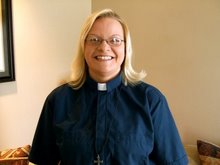Greetings family, friends, supporters, and those who somehow find their way to this blog!
As many know already, I've returned not once but now a second time in the last four months (what a blessing & gift!) to my beloved second home, Peru. It has been a time to reconnect with old friends, dear parishioners, lively children, accompany a visiting group, as well as time to reflect on many things, including how I define "home".
It began with a Garrison Keillor article we were to read as part of our online writing course, from National Geographic's February 2014 issue "There's No Place Like Home". Then, a couple of days ago, Tracy, a member of the visiting companion congregation asked, "Pastora Fran, where is home for you?" The question is more profound than she could have imagined. How could she know that I have thought of this question, and struggled with it for the better part of the last two years? How could she know that even within myself, I still did not have that answer, the answer I have longed for, searched for, and prayed for!
Where is home for me?
Saskatoon, in the western part of Canada, has been a temporary home for the last couple of years. I've lived there three times in my life and the accumulation of those years adds up to almost as long as the years growing up in my home town. The home town I left when I was 23. In Saskatoon, I have a few long-time friends and colleagues. It is the home of my alma mater. I love Saskatoon. A windy river stretches through the treed Meewasin Valley Trail that hugs the river and goes on for miles. Several bridges hundreds of years old cross that river and are the subject of many a visitor and local artist's canvas or photo. On the University campus, the stone buildings are a beige color of limestone (originally) and Tyndall Stone, even new buildings are mandated to use it, according to university by-laws. In the summers it is picturesque. Areas like Broadway offer quaint cafes and restaurants. There is a wonderful live music scene, art galleries, Farmer's Market, local artisan shops and live theater to enjoy there. The downtown as well as the city itself is enjoying a time of revitalization. Though the winter is my least favorite season, in a certain part of the city, even winter sparkles here. It is the city that keeps calling me to return. This time, living in a quiet corner of the university campus, we are a unique mix of International and Canadian students at every level of University and Seminary studies. We form a close-knit community. And in these short two years, through new friendships with immigrants from Spanish-speaking countries, all that I love about Peru: the people, the culture, the language, food, and even the music and dance are all alive in this place I call home...
Yet, this is only my temporary home. I have known it all along. A one year contract was renewed, allowing the opportunity to extend my temporary stay. But this time has always been transitional. It is much like sitting in the belly of the whale. Only unlike Jonah who resisted being sent to Nineveh, the place to which I am being sent is, as yet, unknown. I hope it is not like Nineveh. But I am still in the whale's belly and the where is not entirely mine to know right now. It is God's call after all.
But, where is home for me?
During this transitional time, that some in my life have found incredibly long, this question has hovered, it has lingered, it has challenged, followed, pursued and pushed me in a thousand directions. Some look to geography to determine "home". I used to think this way, too. They are rooted profoundly, deeply, right where they were born, or right where they have chosen to settle for a good portion of their lives, the place that holds memories and story. But as a wise, dear, global friend pointed out one summer day: for some of us, "home" is not determined by our geography. Rather, our roots grow above the ground to surround the earth and include the global village in which we find our home. Our roots grow far and wide, stretching above and around, instead of growing vertically, underground. It is a different sense of rootedness, a different sense of "home". One definition is not of more value than another, it is simply how we are created and how we exist in this world.
A wonderful, liberating image for me, this is the story I shared with Tracy.
Home, then, is everywhere.
With blessings, love, peace, and joy wherever you are rooted, wherever home this day is for you!
Pastora Fran







